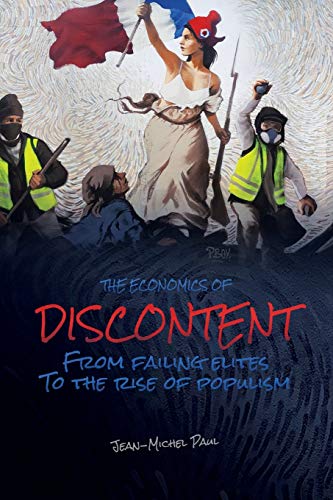The Economics of Discontent
From Failing Elites to The Rise of Populism
Jean-Michel Paul
BOOK REVIEW

In The Economics of Discontent: From Failing Elites to The Rise of Populism, Jean-Michel Paul lays bare the monumental rift in our socioeconomic fabric, urging you to take a long, hard look at the bitter world around you. This book isn't merely a scholarly piece; it serves as a mirror reflecting the disillusionment festering beneath the surface of our contemporary societies. As populist movements surge like wildfires across landscapes once dominated by complacent elites, Paul meticulously dissects the economic and social mechanisms fueling this chaotic revolution.
Every page pulsates with urgency, echoing the visceral frustration that's burgeoning in many of us. While the elite bask in their insulated privileges, the masses are struggling, facing stagnant wages, job insecurity, and a growing sense of abandonment. This book puts you at ground zero for understanding why ordinary people are fed up and clamoring for change. It encapsulates the feeling of an entire generation grappling with the existential dread of a manipulated economic system that favors a select few while leaving the rest to rot on the vine.
Embrace the tumultuous journey that Paul navigates through the shifting paradigms of global economics. He artfully combines intricate data analysis with heart-wrenching narratives, offering not just theories but real-world implications that strike at the core of societal grievances. Readers resonate with his denunciation of failing elites-those who cling to outdated power structures that no longer serve the populace. His prose is a clarion call, compelling you to confront the uncomfortable truths hovering ominously over our political landscape.
Critics of the book often frame it as overly pessimistic, warning that Paul's focus on populism might amplify divisions rather than fostering constructive dialogue. Yet, how can we avert our gaze from the hunger for change when social unrest is escalating? The very fabric of our democracy is at stake, as evidenced by the rise of leaders whose policies often lean towards demagoguery, solely because traditional governance has turned its back on the needs of the many.
Consider the voices of those who've read Paul's work; it mirrors the divided sociopolitical landscape. Some celebrate it as an eye-opening analysis that offers explanations for the inexplicable surge in populist sentiment, while others deem it fear-mongering. This dichotomy adds layers of complexity to your reading experience, pushing you to reassess where you stand in this tumultuous dialogue.
In examining the roots of discontent, Paul deftly connects economic issues with broader cultural disillusionment. The intersectionality of economics and identity politics will leave you questioning your own beliefs and assumptions about society. It's a book that refuses to let you stay comfortable in your seat; it demands engagement, inviting you to explore where your sympathies lie.
History teaches us that revolutions stem from discontent. Paul invokes lessons from the past to weave a narrative that serves as a cautionary tale. The rise of populism in various nations is not merely a reaction; it's a culmination of years of neglect and exploitation. As the elite continue to falter, the questions arise-who will fill the power vacuum? And at what cost?
Dare to grapple with these ideas, as The Economics of Discontent implores you not just to observe the unfolding narratives in politics but to recognize your role in them. It blurs the lines between observer and participant, urging you to reflect on your own positions and privileges, prompting a paroxysm of emotions ranging from despair to hope.
Engaging with this book is like browsing through a gallery filled with haunting portraits of societal anguish, demanding acknowledgment of pain while beckoning you to visualize a different future. As you close its pages, you'll likely encounter an unsettling realization: the very seeds for a new era of governance could sprout from the ashes of the past, urging you not just to be a witness of change but a catalyst for it.
Buckle up; as you plunge into Paul's exploration, prepare for a ride that will challenge your beliefs and ignite your passions. The discontent is palpable, but within it lies the potential for transformation-if only we dare to confront it face-on. 🌍📊✨️
📖 The Economics of Discontent: From Failing Elites to The Rise of Populism
✍ by Jean-Michel Paul
🧾 356 pages
2019
#economics #discontent #from #failing #elites #rise #populism #jean #michel #paul #JeanMichelPaul